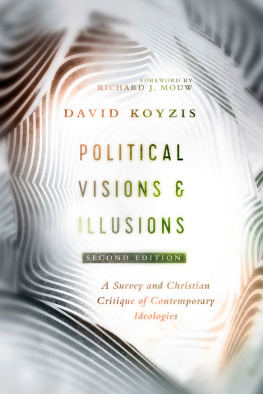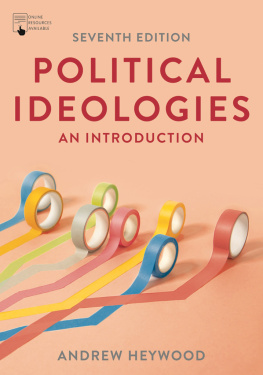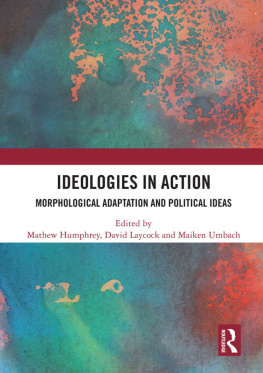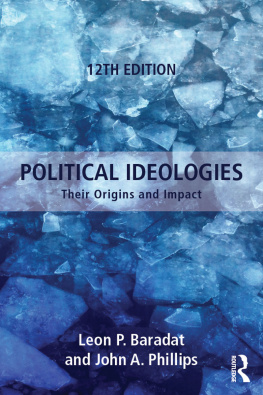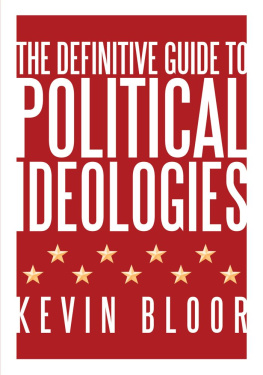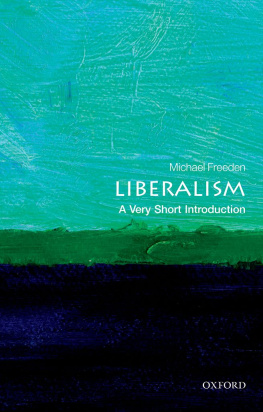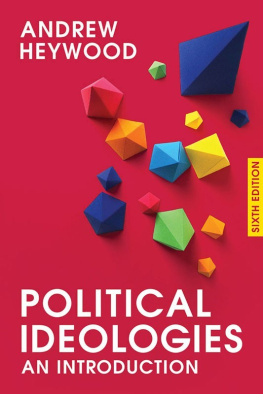Sommaire
Pagination de l'dition papier
Guide
POLITICAL
VISIONS &
ILLUSIONS
A Survey and Christian Critique
of Contemporary Ideologies
SECOND EDITION
DAVID KOYZIS
FOREWORD BY
RICHARD J. MOUW
InterVarsity Press
P.O. Box 1400, Downers Grove, IL 60515-1426
ivpress.com
Second edition 2019 by David T. Koyzis
First edition 2003 by David T. Koyzis
All rights reserved. No part of this book may be reproduced in any form without written permission from InterVarsity Press.
InterVarsity Pressis the book-publishing division of InterVarsity Christian Fellowship/USA, a movement of students and faculty active on campus at hundreds of universities, colleges, and schools of nursing in the United States of America, and a member movement of the International Fellowship of Evangelical Students. For information about local and regional activities, visit intervarsity.org.
The Scripture quotations quoted herein are from the Revised Standard Version of the Bible, copyright 1946, 1952, 1971 by the Division of Christian Education of the National Council of the Churches of Christ in the U.S.A. Used by permission. All rights reserved.
Cover design: David Fassett
Interior design: Jeanna Wiggins
Images: blue abstract watercolor: Nottomanv1 / iStock / Getty Images Plus
old paper texture: ke77kz / iStock / Getty Images Plus
ISBN 978-0-8308-7206-0 (digital)
ISBN 978-0-8308-5242-0 (print)
This digital document has been produced by Nord Compo.
FOREWORD
Richard J. Mouw
DAVID KOYZIS DID NOT HAVE to come up with a new edition of the 2003 version of this book for my sake. I have long been impressed with that version. I have read it several times and regularly turned to it to bone up on specific topics. I have also assigned it, with much success, as a required text for my students.
Now that I have read this new and expanded version, I am delighted that David made the effort. Much has changed in the world of global politics during the past decade and a half. Even as I write this foreword, the daily news reports that I followmainly online these days rather than the hard-copy newspapers I relied on when this book first appearedtell us of political realities that we could not have imagined in 2003. While a good introduction to political thought is of a different genre than daily news reports, it should give us a framework and specific tools for gaining insights into the news. The 2003 edition of this book has served many of us marvelously in this regard, but this new version now brings added value.
I dont know of another writer on political thought who can match the breadth and the depth that David brings to political topics. While he certainly has a solid grasp of the subject matter typically discussed by other political scientists, he also knows legal theory, technological studies, international relations, philosophy, theologyand he even makes effective use of poetry and fiction. His scholarship is a model for those of us in the academy who promote the cause of integrated teaching and learning.
For all of his broad-ranging interests and expertise, David never loses sight of his central focus: casting light on the diversity of ideologies in the history of political thought. The very term ideology, of course, is a contested descriptor. People often use it as an insult: Oh, thats just ideology! It is also regularly used, though, as a neutral term for capturing the essentials of a respected system of political thought.
David nods in both directions. He takes us carefully through the strengths and weaknesses of liberalism, conservativism, nationalism, democratism, and socialismshowing how each of them is, from a Christian perspective, expressive of a fundamentally idolatrous commitment. Each organizes itself around an ultimate commitment to some aspect of the creation. In this sense every ideology is religious, even to the point of embodying some sort of redemptive narrative.
But in treating these ideologies as stemming from idolatrous commitments, David does not present them simply as embodiments of intellectual error. Ill admit that I often get nervous when Christians subsume non-Christian thought and life under the category of idolatry. Doing so encourages a wiser-than-thou judgmentalism regarding everything associated with non-Christian perspective. It is not so, however, with David Koyzis. He uses the concept as a helpful explanatory device that can elucidate the fundamental patterns of a system of thought.
And here is what I find so helpful in how he does this: he wants us also to learn from idolatrous perspectives. Since these systems of thought function within Gods good creation despite the pervasive presence of sin, they are not able entirely to distort their understanding of the world in which they live. But even more, they often have positive insights to offer us. By employing some aspect of the creation as an ultimate category of analysis of political reality, an idolatrous perspective can actually point some things out to us that we might otherwise have missed. For example, the Marxists are certainly wrong when they insist that belief in the afterlife is simply a way of encouraging the oppressed to accept an unjust political-economic status quo. But they do actually get it right in some specific cases. Religion has frequently been used to discourage people from working to correct real injustices.
The alternative to the idolatrous ways of thinking about political life is, of course, to honor the Creators designs for our life together as human creatures. In pointing us to those designs, David provides us with a highly insightful comparative analysis of two robust Christian views of the state: the Catholic system organized around the principle of subsidiarity and the sphere sovereignty perspective developed in Dutch neo-Calvinism, especially by Abraham Kuyper and Herman Dooyeweerd.
In developing the Kuyperian perspective, David is well aware that it needs some reworking for contemporary political realities. The Christian perspective, he insists, can be applied to diverse cultural contexts, with differing ways of construing patterns of governances and forms of political representation. What is nonnegotiable, however, is the biblically inspired vision of the state as an institution built on the exercise of power and guided by the principle of public justice ().
One of the special gifts provided in this new edition is an important concluding section, where David sets forth some reflections on the nature and role of the church vis--vis political life. This Concluding Ecclesiological Postscript is integral to the overall case that he makes in the book, but it can also stand alone as an important contribution to the ongoing Christian discussion of the ways in which the institutional churchdenominational manifestoes about social concerns as well as what gets addressed explicitly in homilies and sermonscan appropriately address significant topics relating to the common good. What David says on this subject is brief, but it manages to clarify more issues in a few pages than many of the theological volumes I have read on the subject. In that regard, it is a fitting conclusion to a book that consistently provides us with much-needed wisdom on matters of vital importance to our life together as creatures of God.

